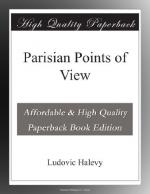To say this is to say that M. Halevy’s irony is delicate and playful. There is no harshness in his manner and no hatred in his mind. We do not find in his pages any of the pessimism which is perhaps the dominant characteristic of the best French fiction of our time. To M. Halevy, as to every thinking man, life is serious, no doubt, but it need not be taken sadly, or even solemnly. To him life seems still enjoyable, as it must to most of those who have a vivid sense of humor. He is not disillusioned utterly, he is not reduced to the blankness of despair as are so many of the disciples of Flaubert, who are cast into the outer darkness, and who hopelessly revolt against the doom they have brought on themselves.
Indeed, it is Merimee that M. Halevy would hail as his master, and not Flaubert, whom most of his fellow French writers of fiction follow blindly. Now, while the author of Salamnbo was a romanticist turned sour, the author of Carmen was a sentimentalist sheathed in irony. To Gustave Flaubert the world was hideously ugly, and he wished it strangely and splendidly beautiful, and he detested it the more because of his impossible ideal. To Prosper Merimee the world was what it is, to be taken and made the best of, every man keeping himself carefully guarded. Like Merimee, M. Halevy is detached, but he is not disenchanted. His work is more joyous than Merimee’s, if not so vigorous and compact, and his delight in it is less disguised. Even in the Cardinal sketches there is nothing that leaves an acrid after-taste, nothing corroding—as there is not seldom in the stronger and sterner short stories of Maupassant.
More than Maupassant or Flaubert or Merimee, is M. Halevy a Parisian. Whether or not the characters of his tale are dwellers in the capital, whether or not the scene of his story is laid in the city by the Seine, the point of view is always Parisian. The Circus Charger did his duty in the stately avenues of a noble country-place, and Blacky performed his task near a rustic water-fall; but the men who record their intelligent actions are Parisians of the strictest sect. Even in the patriotic pieces called forth by the war of 1870, in the Insurgent and in the Chinese Ambassador, it is the siege of Paris and the struggle of the Communists which seem to the author most important. His style even, his swift and limpid prose—the prose which somehow corresponds to the best vers de societe in its brilliancy and buoyancy—is the style of one who lives at the centre of things. Cardinal Newman once said that while Livy and Tacitus and Terence and Seneca wrote Latin, Cicero wrote Roman; so while M. Zola on the one side, and M. Georges Ohnet on the other, may write French, M. Halevy writes Parisian.
BRANDER MATTHEWS.
ONLY A WALTZ
“Aunt, dear aunt, don’t believe a word of what he is going to tell you. He is preparing to fib, to fib outrageously. If I hadn’t interrupted him at the beginning of his talk, he would have told you that he had made up his mind to marry me from his and my earliest childhood.”




